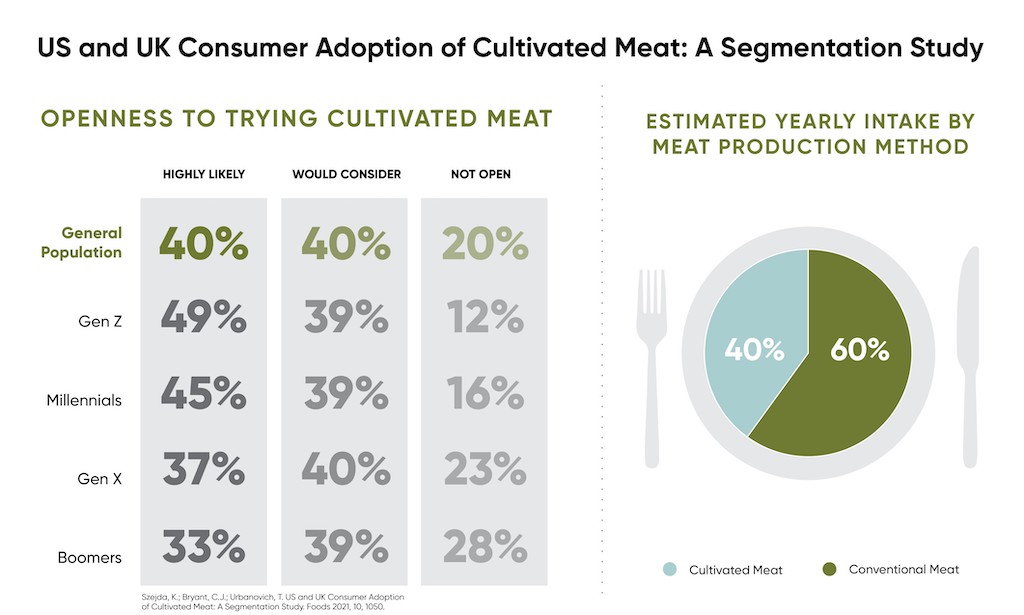4 Mins Read
Consumers believe that cultivated protein could make up as much as 40% of their future meat intake, according to new research. Examining attitudes and adoption of cell-based meats among U.S. and U.K. consumers, the study also found patterns of greater willingness and interest from younger generations to try these products, though general levels of acceptance was observed across all age groups.
New research published in the peer-reviewed journal Foods estimates that cultivated meat will make up a significant part of the meat market in the future. The study, commissioned by Israeli cell-based food tech Aleph Farms, found that the average consumer imagined that cultivated protein will make up at least 40% of their future meat consumption, while conventional meat will constitute the other 60%.
The international team of researchers, led by Dr. Keri Szejda of Arizona State University, surveyed more than 2,000 U.S. consumers and over 2,000 U.K. consumers to examine attitudes and perceptions of the general population on novel cultivated protein products. Most of the participants of the study were not familiar with cell-based protein.
When asked about their willingness to try cultivated meat, the study found significant generational patterns that determined consumers’ enthusiasm. Gen Zs were most open to trying cell-based meat, with 88% of respondents saying they would welcome them, while millennials followed closely behind at 76%.
Around 72% of the boomer generation, on the other hand, were at least “somewhat open” to trying cultivated meat.
“The results suggest that cultivated meat is likely to be widely accepted by the general public, especially the younger generations and an eager group of early adopters who appreciate its benefits across a wide range of social issues. These groups tend to embrace change and need little encouragement to try new food innovations,” explained lead author Dr. Szejda.

The results suggest that cultivated meat is likely to be widely accepted by the general public, especially the younger generations and an eager group of early adopters.
Dr. Keri Szejda, Arizona State University
Overall, around 40% of the entire cohort of consumers from the U.S. and U.K. said they were “very” or “extremely likely” to try cultured meat products, and this group was identified as the “early majority” group who are most likely to be first to adopt the novel product. Most of those within the group identify as omnivores, with around 95% of them consuming meat regularly around two or three times on a daily basis.
Other sociodemographic factors that are also correlated with greater openness include whether consumers are male, more liberal and their education level.
These findings align with previous consumer research on cell-based protein, with one study commissioned by Singapore-based cultured seafood maker Shiok Meats finding that the early adopters were more likely to be younger respondents, though it also found great interest from those who currently declare themselves vegan.
Shiok Meat’s survey was conducted within Singapore, and found that overall, more than 78% of consumers in the city were willing to try cultured seafood after being shown a simple infographic explaining the concept.
The new Aleph Farms-commissioned study also reported a similar finding, revealing that consumers were increasingly supportive of cell-based meat once they had a better understanding and knowledge about the production method, and its associated sustainability and other benefits compared to traditional animal agriculture.

Social proof is important…[Consumers] want to be assured that a product is safe, functional, and beneficial before they adopt it. This is why transparency and trust are cornerstones of our company.
Didier Toubia, Co-Founder & CEO, Aleph Farms
“We observed an increase in support for the technology once consumers had access to additional information, underscoring the importance of effective science communication for consumer adoption,” said Dr. Szejda.
Commenting on the result, Aleph Farms co-founder and CEO Didier Toubia said it will be “critical to develop the right products, based on the right solutions” if we are to “turn this expected acceptance into actual consumption” as the cultivated protein industry matures and reaches the market outside of Singapore.
“In contrast to the younger eager adopters, the older generations are more wary of change,” Toubia continued. “Social proof is important to them and they want to be assured that a product is safe, functional, and beneficial before they adopt it. This is why transparency and trust are cornerstones of our company.”
Aleph Farms has so far debuted the world’s first cultivated ribeye steak using 3D bioprinting and cellular agriculture technologies, as well as a cultured thin-cut steak that has notably been trialled by Israeli prime minister Benjamin Netanyahu. The food tech has forged partnerships with Brazilian food conglomerate BRF and Japanese giant Mitsubishi to bring its cultivated meats to both countries.
All images courtesy of Aleph Farms.




